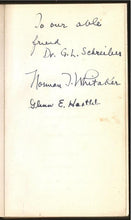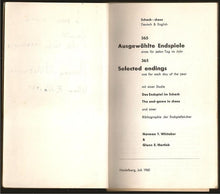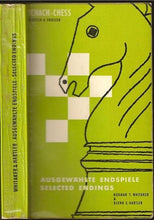Author: Whitaker, Norman Tweed (1890-1975) and Glenn E Hartleb inscribed by the authors
Year: 1960
Publisher: Self published by the authors
Place: Lauterbach and Heidelberg
Description:
unpaginated with diagrams and index. Duodecimo (7" x 4 1/4") bound in original publisher's green pictorial wrappers with errata laid in. Inscribed by the authors. First edition.
This is certainly a useful book, worthy of study. The endgames come from a variety of sources. Some were played over-the-board in grandmaster tournaments. Others are compositions. Only a few were composed by Whitaker or Hartleb. The rest are by major composers such as Grigoriev and Triotzky. One good thing is that, unlike other collections in which the problems are so difficult that nobody could ever solve them, many of these endgames can be solved by normal humans. Only a few are easy to solve, however. There is obviously a program to set aside a few hours every day to study one of the end games. The answers are in the back. The answers are in German algebraic notation, which is a minor inconvenience that most readers will be able to get past without much difficulty. One need only remember that S stands for knight, T for rook, L for bishop and D for queen. As to why such a useful and important work is not better known, the answer obviously lies in the fact that Hartleb was killed and Whitaker seriously injured in a car accident shortly after publication. Also, the press run must have been small. Otherwise, more would have reached the market place.
Norman Tweed Whitaker (April 9, 1890 - May 20, 1975) was an American International Master of chess, a lawyer, a civil servant, and a chess author. He was convicted of several crimes, was disbarred from the practice of law, and served several terms in prison. His most infamous criminal escapade was a confidence trick involving the Lindbergh kidnapping in 1932. Whitaker was taught to play chess at the age of 14 by his father and learned more by watching Harry Nelson Pillsbury, one of the world's very best, play in 1905. Whitaker was a member of the Franklin Mercantile Chess Club in Philadelphia, the nation's second-oldest chess club, and represented Franklin in team matches. This club was named in honor of Benjamin Franklin, a Philadelphia chess enthusiast and one of the most prominent Americans of the 18th century. During Whitaker's early chess years, the Franklin club featured the strong veteran Master Walter Penn Shipley, a lawyer by profession and an experienced chess organizer and promoter. Whitaker in his teens won high-quality games in simultaneous exhibitions against World Chess Champion Emanuel Lasker and future world champion Jose Raul Capablanca. Lasker was in Philadelphia to play part of his World Chess Championship 1907 match against Frank Marshall; Lasker won that match. While not of competitive significance, these achievements by Whitaker boosted his confidence and spurred his further development as a rising talent. In 1921, at Atlantic City, he placed clear second, and top American, in the Eighth American Chess Congress. This series of nine tournaments, staged at irregular intervals between 1857 and 1923, was the forerunner to the modern United States Chess Championship tournament series. Whitaker finished with 8/11, only half a point behind winner Janowski, and ahead of Marshall, both of whom he defeated head-to-head. This was arguably his peak lifetime performance.
Glenn Hartleb, a USCF Expert player, was killed in an automobile accident near Birta, Arkansas while traveling with Norman Tweed Whitaker.
Condition:
Inscribed on front end paper by both authors. Corners bumped, edge wear, spine ends rubbed else a very good copy.
SOLD 2023





